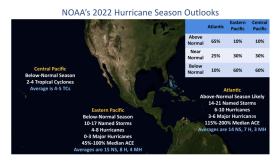-
Extreme heat is the deadliest form of hazardous weather and Jacksonville will soon have data showing how the city is being affected by rising temperatures and which neighborhoods need the most help.
-
Pinellas County's sustainability and resiliency coordinator said he finds NOAA's application guide helpful as he makes plans for an area that's already experiencing tidal impacts and effects to infrastructure.
-
“Not anywhere in the past have we had six consecutive seasons above normal,” Rosencrans said.
-
Hurricane experts say forecasting storm intensity remains a big challenge. That’s especially true in an era of climate change that scientists say is likely producing more powerful and deadly storms.
-
Federal forecasters expect more hurricanes than usual this year. Climate change is driving larger, more destructive storms. This is the seventh year in a row with an above-average forecast.
-
It calls for between 14 and 21 named storms, with six to 10 hurricanes — three to six of which could strengthen into major hurricanes.
-
University of Miami Rosenstiel oceanographer Nick Shay says the Loop Current swings up from the Caribbean toward the Gulf coast like an ocean river, moving warm water hundreds of feet deep. That can help produce dangerous storms like 2018's Hurricane Michael that rapidly intensify.
-
Over the last 40 years, North American cars and power plants have gotten cleaner. They spewed far less pollution into the atmosphere, a difference visible by satellites.
-
Hurricane Preparedness Week, a campaign led by the National Oceanic and Atmospheric Administration (NOAA), begins on Sunday.
-
As attention and urgency ramp up around the world over the looming dangers of climate change, a major new federal report released on Tuesday offers a surprising forecast: It actually reduces the amount of sea level rise the world is expected to see as the Earth warms.
-
Scientists are only more sure that Florida is in for worse flooding in the next 30 years.
-
Sea levels are rising even faster on the East Coast and Gulf Coast. And advances in climate science mean we can see the future clearly for the first time.
Play Live Radio
Next Up:
0:00
0:00
Available On Air Stations











